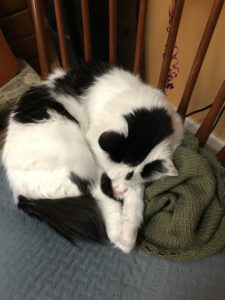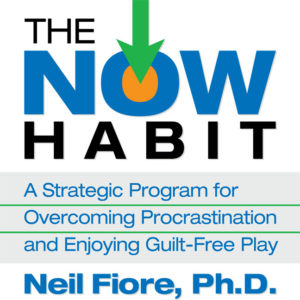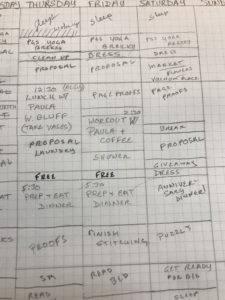Procrastination is so rife among my writer friends and other creatives I know that we don’t even joke about it. We are clichés. While I would never lie about procrastinating when I’m supposed to be working, I rarely volunteer the fact. If another writer confesses to me that she’s procrastinating on getting pages done, I feel a huge sense of relief. There’s no misery like procrastination misery to build solidarity between writer friends.
Even some of the most productive bestselling writers I know sometimes procrastinate. Personally, when I’m in my deepest procrastination moments, I forget that. It feels lonesome, and I become my own harshest judge. (That whole comparing oneself to other writers is deadly too, but we can consider that another time.) Being judgy while procrastinating is doubly unhelpful.
Procrastination offers an escape from tension. If I have a project (or chapter or paragraph or phone call or chore) that makes me feel anxious, I sometimes literally walk away from it. It might be for five minutes. It might be for an hour. It might be for weeks. Eventually I’ll return to it–or, if it’s some kind of chore or event–my lack of action will mean it expires and goes away.
Avoidance. It’s embarrassing to admit that I’m sometimes guilty of it. Ouch.
I’ve read many, many books to try to improve my productivity, shape my behavior, and, yes, fix my procrastination habit. Because it is a habit, not a disease or fatal flaw.
Here’s the latest book I’ve read on the subject:
I listened to it on audio via Overdrive and liked it well enough that I bought the ebook. (I often do that, anecdotal proof that library reads influence consumer book purchases.)
Notice that appealing subtitle. “A Strategic Program for Overcoming Procrastination and Enjoying Guilt-Free Play.” How sexy is that? I couldn’t resist checking it out when I was browsing available audiobooks. The subtitle worked on me exactly the way I’m sure it was intended: put the focus on the positive, not the procrastination.
KillZone is not the place for book reviews, but is about the writing life. So I’ll be brief.
THE NOW HABIT
- Helps you identify when and why you might be procrastinating.
- Doesn’t judge you for procrastinating–and even explains how it becomes an active coping tool.
- Doesn’t prioritize work over pleasure (a real revelation for me).
- Offers some compelling client stories.
- Has focus exercises and talks about the process and importance of flow.
- Helps you create your own “unschedule.”
- Has a good section about dealing with the procrastinators in your life.
- Explores goal setting.
The “unschedule” is my favorite piece of the process because it turns one’s schedule upside down. After blocking out the time you require for life’s necessities like eating, cleaning, sleeping, and tending dependent creatures, you mark out time for things that give you pleasure and put you in a state of play or creative play. Working out, practicing hobbies, spending time with friends. It might happen daily, weekly, or bi-weekly. Whatever you choose. It becomes a priority. A reward to work toward.
Work (or writing or publishing business for most of us here) can become more energizing. More efficient. I confess that on the days I’ve managed to put this into serious practice, I’ve found myself happily working overtime, sometimes working well into my scheduled pleasure time–but not feeling a bit deprived because I know I’ll get to play again soon. Also, I’m getting a huge amount of pleasure from my work hours.
I know many people who have always operated their lives this way. They tend not to be procrastinators, and are what Fiore calls “producers.” If you are one of those people, you either stopped reading this a long time ago, or are shaking your head, wondering what’s wrong with the rest of us. Congratulations! You are in a really good place.
I’ll give you a peek at a part of my “unschedule” from last week. Up to last month, my two primary jobs were writer and homeschool mom. Now I’m a writer with a rising college freshman in the house, so my time is primarily mine to schedule. Everyone’s life circumstances are different, so your mileage will vary.
I make my schedule in pencil because it never works out exactly as I plan and I like to go back and put in what I actually do. It’s quite revelatory for me.
Dealing with procrastination can be a real battle. Particularly for writers. Not all, of course. I’d love to hear from both sides of the aisle. What do you do to fight procrastination, if you fight it at all? If you don’t, what keeps you focused on your goals?

(I won’t tell you how many times I got up from my chair and wandered out into another part of the house as I wrote this. But here’s what happens if I’m gone for even a minute!)



I’m perfectionistic & overly anxious, which guarantees my inclusion in the procrastination category. To a small degree it affects me at work–for example, if I have a complex task to do & I feel I haven’t been given enough information to go on–I put the task off because I want it to be done just right (or it’s just so boring I want to delay doing it).
But mostly this affects the creative stuff cuz that’s far more valuable to me than the day job. Procrastination shows itself in so many ways. Not being able to research enough, delaying starting a project, starting but not finishing because I feel I need more time to get it right etc etc.
I don’t like procrastination but I’ve come to terms with it a little better these days. First, I think there’s a mental fatigue component. If you spend 50+ hours a week at the day job, plus all the other hours you spend on chores of all sorts & sizes, there’s not much left for creativity. I obsessively make note of how I spend my time so I know I’m making good use of almost every minute of every day. I’ve accepted that I need down time too (how else will your subconscious get a chance to gnaw on that novel problem?), that I won’t have the output of Patterson, and that my word count goals are very low compared to others. And I’ve also had to accept that being interested in many creative endeavors–writing, painting, drawing (and more) means my time will always be fractured because each one takes time to develop skill.
In short, haven’t found a cure for procrastination, but have learned that at this point in my life, I just live through the cycles of it the best I can without worrying if other people think I’m doing it ‘right’.
Kris, you’ve described your struggle with procrastination so well. Thank you. That drive to make every minute of the day count already puts you ahead of the game. Your last paragraph says it all—self-acceptance is critical to success.
I find that having a set routine and time to write helps me avoid procrastination. Even so, I don’t know that I’d want to gbet rid of it altogether. I find that procrastination is often a sign I’m not quite ready for the next page or chapter and I need to sort out a few things before sitting down at the keyboard.
Routine, routine, routine. It’s like a magic mantra. Well done, you, making procrastination work for you!
I’m retired. I’ll think about procrastination tomorrow. Or, I may decide to put off thinking about putting off procrastination.
Because if I think about it, I won’t write. I have to write.
Hey, whatever works, Jim!
Oh yeah, I have to fight procrastination! My biggest hurdle is getting past the belief that I have to do things perfectly. To remind me, I even wrote across my calendar this week: ImperfecKtion.
Besides trying to get past the perfectionism, I have two ways of kicking my arse in gear. I break down a task into such short segments that it’d be silly if I did NOT get to work. (Virtually all my chores are only 15 min or less . . . yeah, the perfectionist in me timed them.) And if I’m putting off writing, I tell myself I only have to do it for 5 min. I usually find that the writing isn’t as uncomfortable as I thought, so I can keep going after 5 min.
I’ve learned as a beginning writer this year that I don’t procrastinate when my outline is clear. No more pantsing for me.
And finally, to keep focused on my goals, I visit my ENvision board. The en- prefix is to remind me to ENgage in activities that will bring me closer to my goals. It sits above my writing desk. (Not like I always write in that spot, but still, it’s my writing desk.)
p.s. Your cat is too cute!
Argh. Perfectionism is such a curse! One statement from the book that really struck me was, “Today, I’ll be PERFECTLY HUMAN.”
I love your several ways of self-motivation. The work broken into tiny bits is so effective. And once one gets started, it’s definitely way less intimidating.
PS–Miss Nina is the perfect example of a critter who is simultaneously Beauty AND the Beast!
You really nailed it with this post, Laura. I used to work non-stop, as in 17 hour work days (writing, marketing, etc). Then one day my husband told me he missed me, which felt like a stab to the heart. We had lunch together every day and I always shutdown my computer by 7-8 p.m. to spend time with him. But those words haunted me to the point where I started taking more and more time off to just have fun, and little by little I understood what he meant. Somewhere along the way of trying to balance home and work life procrastination snuck in, especially if I don’t give myself a break between finishing one book and starting another. It took a solid year for me to find a schedule that works, a schedule that places the emphasis on family while still being productive as a writer. Finding our groove is not an easy thing to do, though. You are definitely not alone. {{{hugs}}}